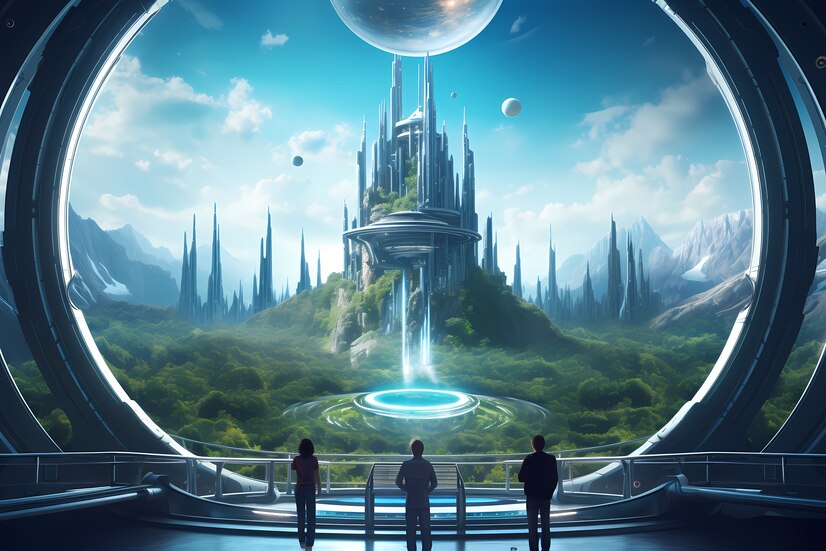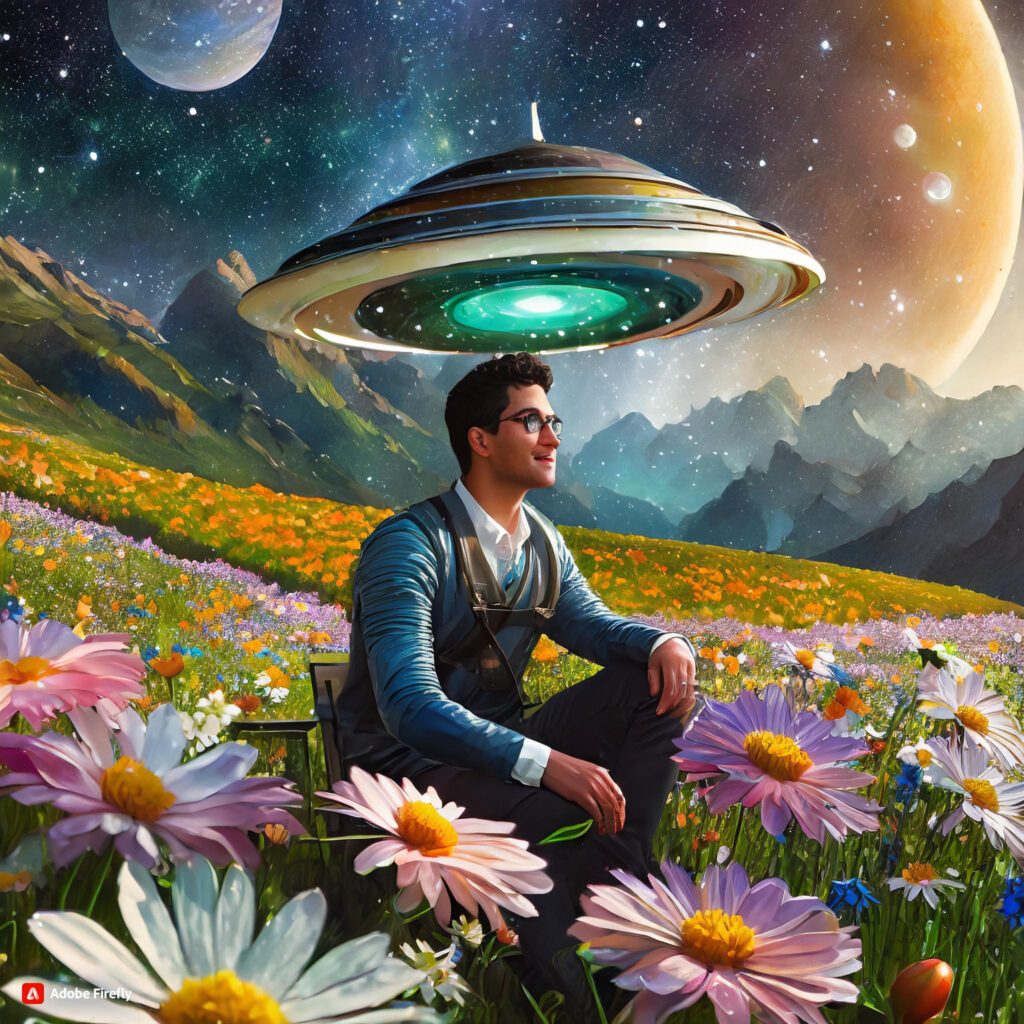
Welcome, fellow literary explorers! Step into the boundless world of science fiction, where themes in literature transcend mere storytelling to unlock profound insights into humanity’s past, present, and future. Join us as we journey beyond the stars to unravel why themes in literature are not just a backdrop but the essence that makes sci-fi an unparalleled genre of imagination and reflection.
Table of Contents
ToggleBeyond the Stars: Sci-Fi Themes Exploring Humanity's Future
Embark on a voyage beyond our earthly confines, where science fiction serves as a visionary lens into the infinite possibilities that await humanity. By exploring themes like artificial intelligence, genetic enhancement, and intergalactic travel, sci-fi propels us into realms where imagination knows no bounds.
In these futuristic landscapes crafted by visionary authors, we confront ethical dilemmas surrounding the advancement of technology and its impact on society. Themes of utopia versus dystopia paint contrasting pictures of what tomorrow may hold for us – a cautionary tale or an aspirational vision yet to be realized.
As we traverse these narratives set against the backdrop of distant galaxies and advanced civilizations, we are prompted to ponder our existence and potential destinies in a universe teeming with mysteries waiting to be unveiled.
Decoding the Message: How Themes in Literature Drive Great Sci-Fi Stories
In the vast universe of science fiction literature, themes play a crucial role in shaping great stories. Themes are not just simple ideas; they are the underlying messages that give depth and meaning to narratives. When we delve into sci-fi tales, we uncover layers of significance woven through futuristic worlds and imaginative scenarios.
Themes in Literature drive great sci-fi stories by serving as guiding principles that explore societal issues, human nature, ethics, or technological advancements in thought-provoking ways. They compel readers to reflect on their own beliefs and perspectives while immersing themselves in captivating adventures across galaxies or alternate dimensions.
By decoding these thematic messages, readers can unravel the intricate web of ideas presented by authors. Themes like artificial intelligence questioning humanity’s essence or time travel exploring consequences create intellectual puzzles for audiences to decipher and ponder upon long after finishing a book.
So next time you pick up a sci-fi novel, pay attention not only to the thrilling plot twists but also to the underlying themes driving the narrative forward – you might discover profound insights hidden within the pages waiting to be decoded.

HereFrom Robots to Dystopias: Exploring Unique Sci-Fi Themes
Dystopias:
Sci-fi’s playground doesn’t limit itself to sleek spaceships and laser battles. Delving deeper, we find a treasure trove of unique themes that push the boundaries of our imagination and challenge our understanding of ourselves and the world.
Let’s take a closer look at two such fascinating examples
Robots:
Beyond robotic sidekicks and uprising Terminators, sci-fi explores the complex relationship between humans and machines. Themes like artificial intelligence questioning its creators, blurring the lines between human and machine consciousness, and the ethical implications of granting robots sentience spark philosophical debates and force us to re-evaluate what it means to be human.
Not all futures are bright. Dystopian sci-fi plunges us into worlds ravaged by ecological collapse, totalitarian regimes, or technological dependence, painting stark reminders of the potential consequences of our choices. These themes serve as cautionary tales, urging us to consider the ethical and societal implications of our current path and inspiring us to strive for a brighter future.
But the journey doesn’t end there. From confronting alien cultures and exploring alternate realities to facing the consequences of genetic engineering and questioning the nature of time, sci-fi offers a diverse landscape of unique themes waiting to be unraveled. Each theme acts as a portal, inviting us to contemplate the complexities of existence, ponder the possibilities of tomorrow, and ultimately, gain a deeper understanding of ourselves and the universe we inhabit.
More Than Fun: Sci-Fi Themes & Real-World Impact
While spaceships blasting across the cosmos and laser battles might be a thrilling draw, sci-fi’s impact extends far beyond mere entertainment. Beneath the surface of its imaginative scenarios and futuristic settings lie themes that profoundly resonate with our real world, sparking vital conversations and even influencing technological advancements.
Take themes like artificial intelligence (AI). Sci-fi has long explored the potential dangers and ethical dilemmas of advanced AI, from benevolent robots questioning their programming to malevolent machines seeking world domination. These narratives not only entertain but also serve as a mirror reflecting our anxieties and hopes surrounding the rapid development of AI in our present day. As we push the boundaries of artificial intelligence, sci-fi’s explorations of its potential impact act as a cautionary and aspirational force, encouraging us to consider the ethical implications of our creations.
Similarly, dystopian narratives don’t just warn us of impending doom. They serve as cautionary tales, highlighting the potential consequences of societal trends, environmental concerns, or technological dependence unfolding in our world. Whether it’s climate change mirroring dystopian landscapes ravaged by ecological collapse or totalitarian regimes reflecting our anxieties about surveillance and control, sci-fi compels us to critically examine our present and work towards a better future.
The impact doesn’t stop there. Science fiction has demonstrably influenced real-world advancements. Jules Verne’s visionary descriptions of submarines in “Twenty Thousand Leagues Under the Sea” inspired early underwater exploration, while Arthur C. Clarke’s prediction of geostationary communication satellites in “The Fountains of Paradise” paved the way for the development of our own. These are just a few examples of how sci-fi’s exploration of futuristic concepts can fuel innovation and pave the way for real-world advancements.
Ultimately, sci-fi’s unique themes act as a bridge between imagination and reality, prompting us to ponder the possibilities of tomorrow and consider the implications of our present choices. It’s not just escapism; it’s a powerful tool for reflection, discussion, and even shaping the future we create.

From Reader to Analyst: Unlocking Sci-Fi's Meaningful Layers
Step aside from the awe-inspiring visuals and heart-pounding action for a moment, fellow sci-fi enthusiast. Beneath the dazzling surface of futuristic technology and interstellar adventures lies a hidden treasure trove – themes waiting to be unearthed and analyzed. By transitioning from passive reader to active analyst, you unlock a whole new dimension of enjoyment and understanding.
Imagine yourself as a cosmic detective, tasked with unraveling the intricate web of ideas woven into the narrative tapestry. Start by identifying the recurring themes – are they exploring the ethical boundaries of artificial intelligence, grappling with the complexities of time travel, or questioning the definition of humanity in a technologically advanced future?
Once you’ve identified the suspects, delve deeper. How are these themes portrayed through plot points, character interactions, and even seemingly insignificant details? Consider the author’s use of symbolism, metaphors, and foreshadowing – each could be a clue pointing towards a deeper meaning.
Remember, sci-fi themes are rarely black and white. They invite debate, challenge your assumptions, and force you to see the world through a different lens. Don’t shy away from questioning the author’s message, exploring multiple interpretations, and even drawing parallels to real-world issues.
This analytical journey isn’t just about deciphering hidden messages; it’s about enriching your perspective. By actively engaging with the themes, you’ll see the story not just as an entertaining escape, but as a thought-provoking catalyst for introspection. You’ll find yourself questioning your own beliefs, values, and understanding of the world around you.
So, the next time you embark on a sci-fi adventure, remember – you’re not just a passenger on a spaceship; you’re a detective, an analyst, an explorer of the human experience disguised as a thrilling journey through the cosmos. By unlocking the thematic layers, you’ll discover a whole new universe of meaning within the pages, one that resonates with your reality and leaves you pondering long after the final page is turned.
Predicting the Future: Today's Sci-Fi Themes, Tomorrow's Reality
Gazing through the lens of sci-fi themes is like peering into a crystal ball reflecting not just our fantastical dreams, but also the seeds of our potential future. Today’s anxieties about artificial intelligence infiltrating our lives find chilling echoes in narratives of robotic uprisings. Our concerns over climate change cast haunting shadows in dystopian tales of ravaged landscapes. These aren’t merely predictions; they’re cautionary reflections, urging us to consider the ripple effects of our choices on the fabric of tomorrow. And sometimes, sci-fi isn’t just a mirror; it’s a map. Themes exploring space exploration, genetic engineering, or mind-machine interfaces ignite the spark of possibility, inspiring innovation and paving the way for advancements that once seemed like mere fiction. Whether serving as a warning or a blueprint, sci-fi’s themes act as a bridge between the present and the unknown, reminding us that the stories we tell today might very well shape the realities we face tomorrow
conclusion:
This is an endlessly interesting subject, but it would be inappropriate to write more because of unnecessary length.
These narratives aren’t just entertaining; they’re essential conversation starters, urging us to ponder the ethical implications of technology, the fragility of our world, and the enduring quest for meaning in a vast universe. So, dear reader, keep exploring, keep questioning, and remember, the greatest sci-fi adventures are often the ones that take place within the depths of our imagination, ignited by the sparks of the theme.
To what extent this article has been successful in conveying its information, in fact, my attempt to do justice to it will await the attention of the reader.


Mygreat learning For the reason that the admin of this site is working, no uncertainty very quickly it will be renowned, due to its quality contents.
Real Estate Awesome! Its genuinely remarkable post, I have got much clear idea regarding from this post . Real Estate
Very nice article and straight to the point. I don’t know if this is actually the best place to ask but do you folks have any ideea where to employ some professional writers? Thank you 🙂
An attention-grabbing discussion is value comment. I feel that you must write extra on this matter, it may not be a taboo subject but generally persons are not enough to speak on such topics. To the next. Cheers
Wow! Interesting, this article is awesome 👌
This blog is like a safe haven for me, where I can escape the chaos of the world and indulge in positivity and inspiration